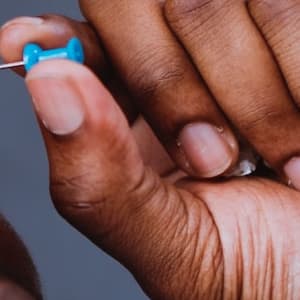get fresh: Idiom Meaning and Origin
What does ‘get fresh’ mean?
The idiom "get fresh" means to behave impertinently or disrespectfully, typically by making inappropriate or forward comments or advances.

Idiom Explorer
This idiom means to begin with a fresh start or a new approach, without any preconceived notions or biases from the past.
The idiom *in your face* means to confront someone with something aggressively or boldly, often to provoke a reaction. It implies direct and unapologetic behavior, disregarding social boundaries.
The idiom "get wet" means to be exposed to or experience something new or unfamiliar, often in a difficult or challenging way. It implies facing a novel situation that may be uncomfortable or outside one's comfort zone.
The idiom "get up the yard" means to become angry or annoyed. It is commonly used to describe someone who becomes frustrated or irritated.
The idiom "get straight" means to clarify or explain something in a direct and understandable manner.
The idiom "get changed" means to change one's clothes or appearance, typically in order to look more presentable or appropriate for a specific situation or event.
The idiom "get bent" is an offensive expression typically used to dismiss or belittle someone, urging them to go away or expressing frustration towards them. It is considered rude and impolite.
Decoding the Invitation
The idiom "get fresh" is a commonly used phrase in American English. Its origin can be traced back to the early 20th century. This idiom is used in informal contexts and understood by a wide range of English speakers in the United States. Let's explore the meaning and usage of this idiom.
The primary meaning of "get fresh" is to behave impertinently or inappropriately towards someone, often in a disrespectful or presumptuous manner. It can also refer to someone making unwelcome advances or showing a lack of respect for personal boundaries. This idiom describes improper behavior or makes a complaint about someone's actions.
You can use the phrase "get fresh" in various situations to convey disapproval or express displeasure with someone's attitude or actions. It is often employed when a person crosses a social or personal boundary. For example, if someone makes lewd or suggestive comments, intrudes into personal space, or exhibits rudeness by disregarding social norms, you can use the idiom "get fresh" to label their behavior.
Additionally, "get fresh" has a connection to personal grooming. It can describe someone who is overly concerned about their physical appearance or who has an excessive focus on maintaining a fashionable or trendy appearance. It can also apply to someone who is overly flirtatious or suggestive in a manner that is seen as inappropriate or offensive.
The idiom "get fresh" is deeply ingrained in American culture, particularly in colloquial language and informal conversations. It is primarily used in spoken English rather than formal written communication. The phrase has become an accepted part of American vernacular, understood by both young and old, and used across various regions of the United States.
The etymology of "get fresh" is somewhat elusive. While there are no definitive sources that pinpoint its precise origin, it is believed to have emerged in the early 20th century. The phrase likely developed from the word "fresh," meaning impudent or cheeky. Over time, it expanded to encompass a broader range of meanings, including inappropriate behavior or unwelcome advances.
The idiom "get fresh" holds a prominent place in American English and is primarily used to describe inappropriate or disrespectful behavior. Its origin can be traced back to the early 20th century, although the specific details remain uncertain. This idiom reflects societal norms and boundaries, serving as a way to express disapproval or describe actions that cross those boundaries. Its usage has become deeply ingrained in informal conversations, making it a well-known and understood phrase among English speakers in the United States.
The idiom "get fresh" is related to several idioms that share a common theme of starting anew or behaving in a particular manner. These idioms include "fresh-faced," "start with a clean sheet," and "fresh legs."
The phrase "fresh-faced" is often used to describe someone who has a youthful appearance or looks lively and energetic. This idiom can be used to complement the idea of "get fresh," as both phrases convey a sense of vitality and enthusiasm. For example, you may describe a person as "get fresh" and "fresh-faced" to emphasize their energetic and lively nature.
The idiom "start with a clean sheet" means to begin something with a fresh and unburdened mind, without any preconceived notions or biases. This idiomatic expression can be related to "get fresh" as it suggests starting anew, letting go of past circumstances, and approaching something with a fresh perspective. It implies a clean slate and a willingness to leave behind any negative experiences or biases that may hinder progress.
Lastly, the phrase "fresh legs" is often used in sports or physical activities to refer to a person who has recently joined the game or activity and possesses a high level of energy and stamina. In the context of "get fresh," the idiom "fresh legs" can be used to describe someone who is keen and eager to participate in a situation or display a great deal of enthusiasm and energy. It can indicate a readiness to take on challenges and approach tasks with a renewed sense of vigor and excitement.
Example usage
Examples of how the idiom "get fresh" can be used in a sentence:
- She told him to stop getting fresh with her and to respect her personal space.
- The chef went to the market to get fresh ingredients for tonight's dinner.
- My mom always tells me to get fresh air and go outside when I'm feeling stressed.
The idiom "get fresh" can be used in different contexts to imply different meanings. In the first example, it is used to describe someone making inappropriate or disrespectful advances towards another person. In the second example, it is used to convey the action of obtaining or acquiring fresh ingredients. The third example uses the idiom figuratively to suggest the need for fresh air or a change of environment to alleviate stress. Overall, these examples demonstrate the versatility of the idiom "get fresh" and how it can be used in various situations.
More "Slang" idioms



